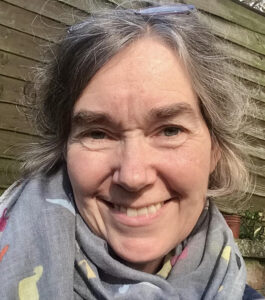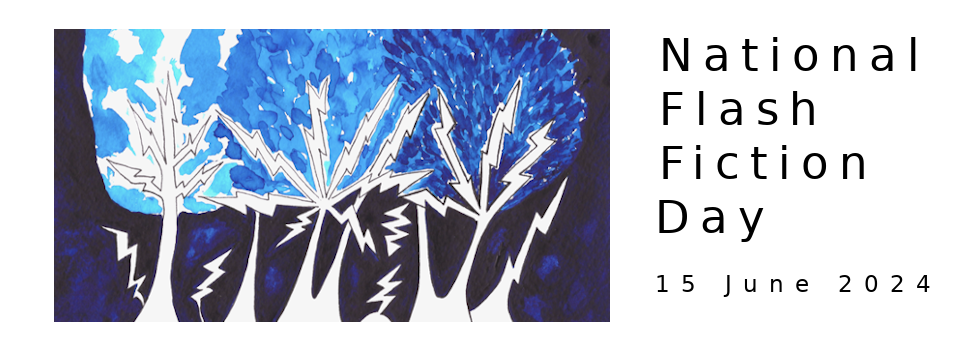Welcome to the fourth in our series of interviews with this year's National Flash Fiction Day Anthology editors and Microfiction Competition judges. This week, Diane Simmons chats with Sharon Telfer, one of this year's judges for the 2021 NFFD Microfiction Competition, about historical fiction, favourite authors, and her starting point as a flash fiction writer, as well as her advice to writers entering the microfiction competition....
Diane: You are an editor for FlashBack Fiction and obviously enjoy reading and writing historical fiction. Is there any period of history that attracts you to write about more than others?
Sharon: ‘When’ is as much a setting as ‘where’ for me. Time adds another layer for thinking about how we live now. We walk through those layers every day. My small town, for instance, is named in the Domesday Book, there’s a WW2 airfield (now a gliding club), a medieval church built with wool money, a 500-year-old school, a 1930s cinema (now an arts centre), a half-demolished hall (now a Buddhist centre), a Victorian water lily collection, a disused canal head, and an ancient pond that originally supplied trout to a long-gone monastery. My regular walk takes in a footpath used by the Pilgrimage of Grace. Recent building round the edge of town has unearthed Bronze Age warriors and an Iron Age chariot (complete with horses). I’m fascinated by these changes and connections. So, I don’t really think of myself as writing historical fiction: the time setting depends on each story. I hope FlashBack shows anyone – editors, writers, judges, readers – who might still be tempted to set historical flash aside in a separate box just how versatile, relevant and powerful it can be. We’ve published some amazing flash.
Diane: As a micro fiction judge this year, do you have any advice for entrants? I know for instance that you consider language to be very important in a flash.
Sharon: Use everything. Use the title. Use the space between the title and the opening. Use the music of the language and the pace of the telling. Use the length of your words, sentences and paragraphs. Use segments or subheads or the headlong rush of a single paragraph. Use your reader’s expectations to complete patterns and to surprise them. Use those ghosts of other words hovering round the ones you put down. Use every comma and full stop. Use tenses and moods. Use that crystal ring at the story’s end. You have so much more than 100 words in your toolbox.
Diane: Can you remember when you first started reading flash? Is there any particular flash that you remember admiring from that time?
Sharon: I started writing flash by chance, before I started reading it. In 2015 I spotted Faber Academy’s competition on Twitter and thought I’d have a go. Every Friday, QuickFic set a prompt, then published their favourite three stories (max 250 words) that afternoon. Next I discovered AdHoc Fiction, another weekly prompt, with a little longer writing time but only 150 words. These were wonderful reading and writing playgrounds. Inspired, I entered the first Bath Flash Fiction award. I got absolutely nowhere. But the two top stories, by William Davidson and Eileen Merriman, blew me away. After that, I was hooked.
Diane: Who is the writer you most admire?
Sharon: The impossible question! One writer I’d urge anyone who loves reading or writing short fiction to read Carys Davies, especially her two collections, Some New Ambush and The Redemption of Galen Pike. These are mostly short stories, although there are some flash pieces and some brilliantly imagined historical(ish) settings. The rich, detailed worlds she creates are utterly recognisable and believable, while also sharp and unsettling. The endings make you rethink everything you’ve read before. I don’t know how she does it – though she has said that the title story of Galen Pike took her 10 years to get right!
 Sharon Telfer cut her micro teeth on the weekly @AdHocFiction competitions. Her flash fiction has won prizes, including the Bath Flash Fiction Award (2020 and 2016) and the Reflex Flash Fiction Prize (2018). Her stories have also been chosen for the ‘BIFFY50’ (2019 and 2020) and Best Microfiction 2019. She’s a founding editor at FlashBack Fiction, the online litmag showcasing historical flash.
Sharon Telfer cut her micro teeth on the weekly @AdHocFiction competitions. Her flash fiction has won prizes, including the Bath Flash Fiction Award (2020 and 2016) and the Reflex Flash Fiction Prize (2018). Her stories have also been chosen for the ‘BIFFY50’ (2019 and 2020) and Best Microfiction 2019. She’s a founding editor at FlashBack Fiction, the online litmag showcasing historical flash.
She grew up on Teesside and now lives in the Yorkshire Wolds. In 2018, she was the New Writing North/Word Factory Short Story Apprentice. She placed second in the 2020 Bath Short Story Award. Another story has been selected for the Test Signal anthology of the best contemporary Northern writing, to be published by Dead Ink Books and Bloomsbury in 2021. She tweets @sharontelfer.
SUBMISSIONS ARE NOW OPEN for this year's National Flash Fiction Day Anthology and Micro Fiction Competition. Submissions close on 15th February 2021. For more information, please visit our Anthology and Competition guidelines.
